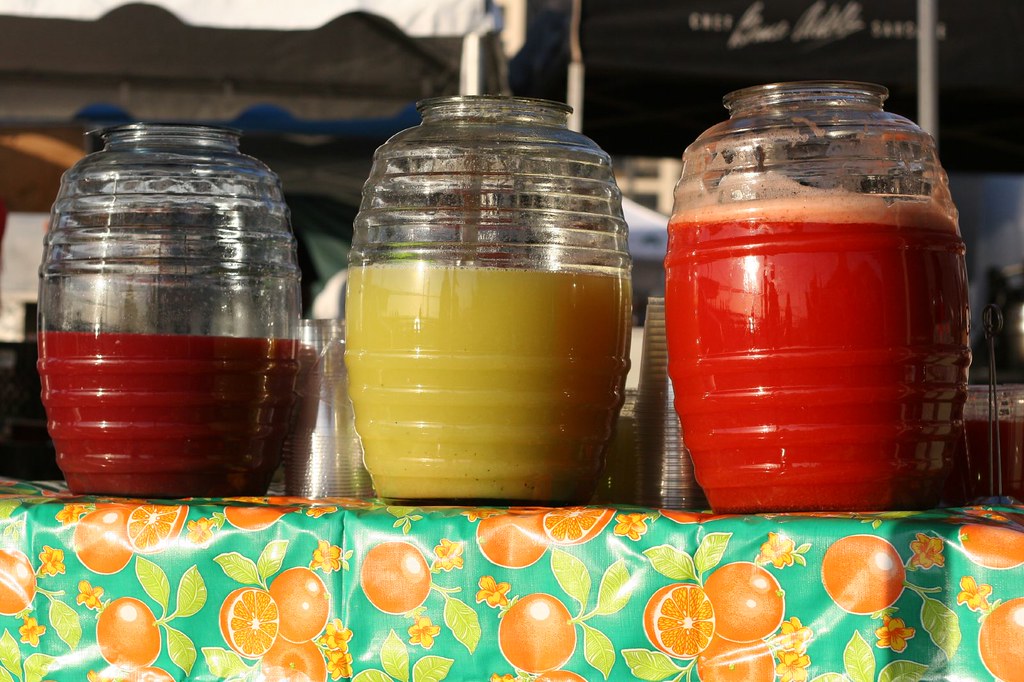What we drink
Mexicans enjoy a variety of non-alcoholic drinks that are popular across the country. Aguas frescas are a common choice; these are refreshing, sweet beverages typically made with water, sugar, and fruits or other natural ingredients. Popular flavors include jamaica, made from the calyces of hibiscus flowers, and horchata, a milky drink made from rice. Other fruit-based aguas frescas, such as those flavored with watermelon, are also widely consumed.
 cc0
cc0
In addition to aguas frescas, licuados, which are fruit shakes or smoothies, and fresh-squeezed orange juice are popular non-alcoholic options. During festive occasions like Christmas and the Day of the Dead, atole is a favored drink. Atole is a warm beverage made from corn or rice meal, water, and spices, providing a comforting and traditional option.
Mexico is known for its diverse range of traditional alcoholic beverages, many of which have deep cultural and historical roots.
 cc0
cc0
- Tequila: This is perhaps the most famous Mexican spirit, made primarily from the blue agave plant. It is produced mainly in the area surrounding the city of Tequila in the state of Jalisco. Tequila is a type of mezcal, but it has its own distinct production process and flavor profile.
- Mezcal: A distilled alcoholic beverage made from the fermented juice of the agave plant. Unlike tequila, mezcal can be made from various types of agave and is known for its smoky flavor, which comes from the traditional method of cooking the agave hearts in underground pits.
- Pulque: This is a traditional fermented beverage made from the sap of the agave plant. It has a milky appearance and a sour taste, with an alcohol content of about 6%. Pulque has been consumed in Mexico since the pre-Columbian era and is often flavored with fruits or spices.
- Paloma: A popular cocktail made with tequila, grapefruit-flavored soda, and lime juice. It is often considered the national drink of Mexico and is known for its refreshing taste.
These beverages not only represent Mexico's rich cultural heritage but also highlight the country's unique use of the agave plant in creating distinctive alcoholic drinks.
https://www.britannica.com/chatbot
Cline, Howard F. , Palerm, Angel , Parkes, Henry Bamford , Bernstein, Marvin David , Willey, Gordon R. , Griffin, Ernst C. and Meyer, Michael C.. "Mexico". Encyclopedia Britannica, 24 Sep. 2024, https://www.britannica.com/place/Mexico. Accessed 24 September 2024.
Willey, Gordon R. , Meyer, Michael C. , Parkes, Henry Bamford , Bernstein, Marvin David , Cline, Howard F. , Palerm, Angel and Griffin, Ernst C.. "Mexico". Encyclopedia Britannica, 24 Sep. 2024, https://www.britannica.com/place/Mexico. Accessed 24 September 2024.
Siciliano-Rosen, Laura. "atole". Encyclopedia Britannica, 14 Jul. 2023, https://www.britannica.com/topic/atole. Accessed 24 September 2024.
Britannica, The Editors of Encyclopaedia. "pulque". Encyclopedia Britannica, 4 Feb. 2021, https://www.britannica.com/topic/pulque. Accessed 24 September 2024.
Martin, Roland. "mezcal". Encyclopedia Britannica, 17 Sep. 2024, https://www.britannica.com/topic/mezcal. Accessed 24 September 2024.
Cunningham, John M. and Grannan, Cydney. "Spirited Away: 9 Liquors from Around the World". Encyclopedia Britannica, 30 Nov. 2023, https://www.britannica.com/story/spirited-away-9-liquors-from-around-the-world. Accessed 24 September 2024.
Payne, Laura. "paloma". Encyclopedia Britannica, 5 Sep. 2024, https://www.britannica.com/topic/paloma. Accessed 24 September 2024.
 cc0
cc0
 cc0
cc0